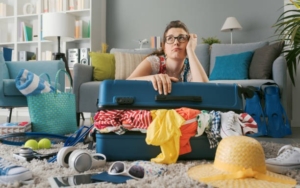 Vacations are great for relaxation, and they are necessary, but they don’t always address the underlying causes of burnout. Vacations are often expected to be the ultimate time to recharge after feeling stress and burnout. It is also assumed that one will return feeling much more refreshed but what happens when you get back from a vacation and you are still feeling like when you left or even worse? You might be experiencing a post-vacation burnout. This is beyond your regular tiredness, it is a deeper form of physical and emotional fatigue that lingers for longer than it is expected to. One is likely to feel exhausted, have low motivation and energy. This can be due to unresolved stressors still at work or home, poor work-life balance, disconnection from values, physical depletion, pressure to “catch up” immediately, etc.
Vacations are great for relaxation, and they are necessary, but they don’t always address the underlying causes of burnout. Vacations are often expected to be the ultimate time to recharge after feeling stress and burnout. It is also assumed that one will return feeling much more refreshed but what happens when you get back from a vacation and you are still feeling like when you left or even worse? You might be experiencing a post-vacation burnout. This is beyond your regular tiredness, it is a deeper form of physical and emotional fatigue that lingers for longer than it is expected to. One is likely to feel exhausted, have low motivation and energy. This can be due to unresolved stressors still at work or home, poor work-life balance, disconnection from values, physical depletion, pressure to “catch up” immediately, etc.
Some signs of post-vacation burnout include physical fatigue, lack of pleasure in things you would normally enjoy, difficulty sleeping, increased frustration over minor inconveniences and anxiety. If this sounds familiar to you, you are not alone. Here are a few tips to help manage post-vacation burnout:
- Ease back into routine: while it’s important to get back into working, you also want to make sure you don’t rush into it as it might worsen the burnout and affect you in the long-run. If possible, plan to return a day or two before resuming work so you give yourself time to transition. Use this time to unpack, catch up on sleep and mentally prepare for what is ahead.
- Reflect on the root cause: If your vacation didn’t recharge you, it is time to reflect on what is causing it. Is your burnout tied to an unrealistic work culture that has been made? Is it tied to emotional and physical exhaustion or a change in interest? Are you struggling with anxiety or depression? Do you feel overworked or underworked? Take time to reflect on what could be coming up for you and try to figure out what could be changed.
- Make sustainable changes: if your current routine doesn’t seem to work like it used to, try switching things up, adjust your schedule, set clearer boundaries, incorporate rest into your daily life, create a more peaceful environment at home and work. Small changes can have a huge impact on mental clarity.
- Reach out for support: if the exhaustion won’t lift, consider speaking to a counselor. They can help you explore what is going on, whether it is clinical burnout, anxiety or something deeper, and they can guide you in finding ways to be better.
Taking a vacation always seems like the best way to reset, and while it is, there could be something deeper going on and it is important that that is reflected on. Burnout impacts one severely and you shouldn’t have to go through it all by yourself. If you find yourself experiencing the above symptoms and are not able to figure out what it could be, our counselors at Capital EAP are here to guide you in every step of the way. You can reach out to us at 518-465-3813 to contact our intake team to help you set up an appointment.
By: Oreoluwa Afolabi, MHC Intern
